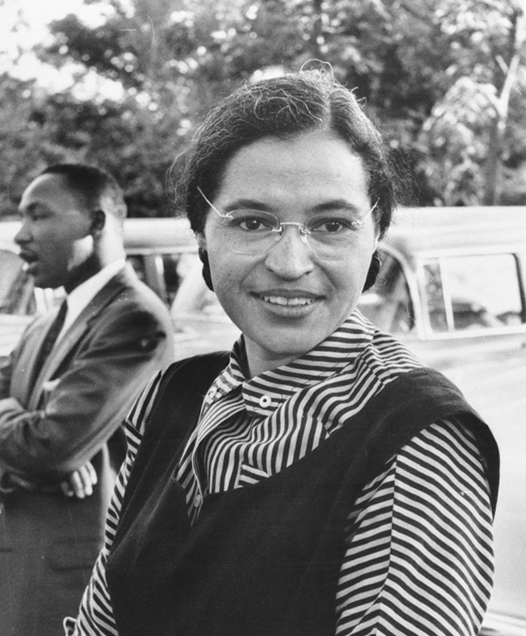Inspiring Women Series: Rosa Parks

Memories of our lives, of our works, and our deeds will continue in others ~ Rosa Parks
Inspiring Women Series: Rosa Parks
Rosa Parks was born Rosa Louise McCauley in Tuskegee, Alabama, on February 4, 1913. Her parents, Leona, a teacher and James McCauley, a carpenter.She was small as a child and suffered poor health with chronic tonsillitis. When her parents separated, she moved with her mother to Pine Level, just outside the state capital, Montgomery. She grew up on a farm with her maternal grandparents, mother, and younger brother Sylvester.
Rosa attended rural schools until the age of eleven. As a student at the Industrial School for Girls in Montgomery, she took academic and vocational courses. Parks went on to a laboratory school set up by the Alabama State Teachers College for Negroes for secondary education, but dropped out in order to care for her grandmother and later her mother, after they became ill.
Around the turn of the 20th century, the former Confederate states had adopted new constitutions and electoral laws that effectively disenfranchised black voters and, in Alabama, many poor white voters as well. Under the white-established Jim Crow laws, passed after Democrats regained control of southern legislatures, racial segregation was imposed in public facilities and retail stores in the South, including public transportation. Bus and train companies enforced seating policies with separate sections for blacks and whites. School bus transportation was unavailable in any form for black schoolchildren in the South, and black education was always underfunded.
Parks recalled going to elementary school in Pine Level, where school buses took white students to their new school and black students had to walk to theirs:
I'd see the bus pass every day ... But to me, that was a way of life; we had no choice but to accept what was the custom. The bus was among the first ways I realized there was a black world and a white world.
Although Parks' autobiography recounts early memories of the kindness of white strangers, she could not ignore the racism of her society. When the Ku Klux Klan marched down the street in front of their house, Parks recalls her grandfather guarding the front door with a shotgun. The Montgomery Industrial School, founded and staffed by white northerners for black children, was burned twice by arsonists. Its faculty was ostracized by the white community.
Repeatedly bullied by white children in her neighborhood, Parks often fought back physically. She later said: "As far back as I remember, I could never think in terms of accepting physical abuse without some form of retaliation if possible."

On December 1, 1955, in Montgomery, Alabama, Parks rejected bus driver James F. Blake's order to relinquish her seat in the "colored section" to a white passenger, after the whites-only section was filled. Parks was not the first person to resist bus segregation, but the (NAACP) believed that she was the best candidate for seeing through a court challenge after her arrest for civil disobedience in violating Alabama segregation laws. Parks' prominence in the community and her willingness to become a controversial figure inspired the black community to boycott the Montgomery buses for over a year, the first major direct action campaign of the post-war civil rights movement. Her case became bogged down in the state courts, but the federal Montgomery bus lawsuit Browder v. Gayle resulted in a November 1956 decision that bus segregation is unconstitutional under the Equal Protection Clause of the 14th Amendment to the U.S. Constitution.
Parks' act of defiance and the Montgomery bus boycott became important symbols of the movement. She became an international icon of resistance to racial segregation. She organized and collaborated with civil rights leaders, including Edgar Nixon, president of the local chapter of the NAACP; and Martin Luther King Jr, a new minister in Montgomery who gained national prominence in the civil rights movement and went on to win a Nobel Peace Prize.
At the time, Parks was employed as a seamstress at a local department store and was secretary of the Montgomery chapter of the NAACP. She acted as a private citizen "tired of giving in". Although widely honored in later years, she also suffered for her act; she was fired from her job, and received death threats for years afterwards.
Shortly after the boycott, she moved to Detroit, where she briefly found similar work. From 1965 to 1988, she served as secretary and receptionist to John Conyers, an African-American US Representative.
The 1970s were a decade of loss for Parks in her personal life. Her family was plagued with illness; she and her husband had suffered stomach ulcers for years and both required hospitalization. In spite of her fame and constant speaking engagements, Parks was not a wealthy woman. She donated most of the money from speaking to civil rights causes, and lived on her staff salary and her husband's pension. Medical bills and time missed from work caused financial strain that required her to accept assistance from church groups and admirers.
Her husband died of throat cancer on August 19, 1977, and her brother, her only sibling, died of cancer that November. Her personal ordeals caused her to become removed from the civil rights movement. Parks suffered two broken bones in a fall on an icy sidewalk, an injury which caused considerable and recurring pain. She decided to move with her mother into an apartment for senior citizens. There she nursed her mother Leona through the final stages of cancer and geriatric dementia until she died in 1979 at the age of 92.
In 1992, Parks published Rosa Parks: My Story, an autobiography aimed at younger readers, which recounts her life leading to her decision to keep her seat on the bus. A few years later, she published Quiet Strength (1995), her memoir, which focuses on her faith.
At age 81, Parks was robbed and assaulted in her home in central Detroit on August 30, 1994. The assailant, Joseph Skipper, broke down the door but claimed he had chased away an intruder. He requested a reward and when Parks paid him, he demanded more. Parks refused and he attacked her. Hurt and badly shaken, Parks called a friend, who called the police. A neighborhood manhunt led to Skipper's capture and reported beating. Parks was treated for facial injuries and swelling on the right side of her face. Parks said about the attack on her by the African-American man, "Many gains have been made ... But as you can see, at this time we still have a long way to go." Skipper was sentenced to 8 to 15 years and was transferred to prison in another state for his own safety.
Parks died of natural causes on October 24, 2005, at the age of 92, in her apartment on the east side of Detroit. She and her husband never had children and she outlived her only sibling.
Information from Wikipedia

Comments
No comments currently. Be the first to comment!
Inspirational

▾ Other Recent Blog Posts ▾
All Rights Reserved 2026, Unraveling My Heart the Write Way - Admin Login | Alt Media Studios





